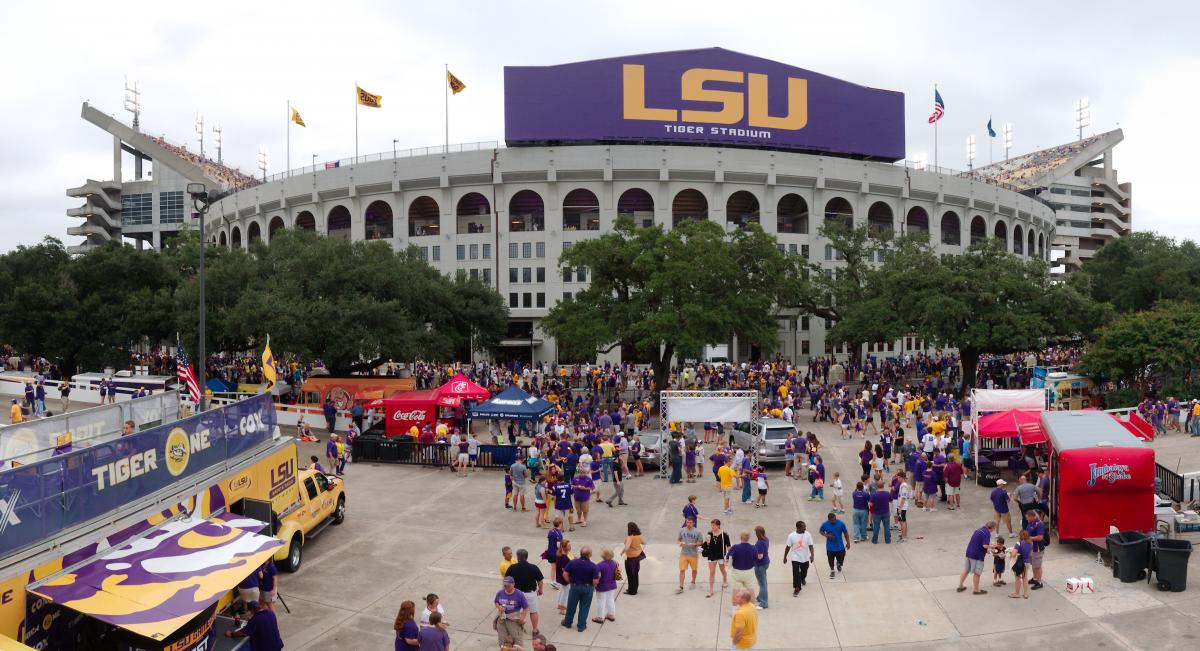
The coronavirus is hitting big-time college football teams, which were allowed by the National Collegiate Athletic Association to begin voluntary practices June 1.
Louisiana State University, the defending national champion, confirmed that at least 30 players are in quarantine because they tested positive for COVID-19 or were found to have contact with individuals who tested positive, according to WAFB Channel 9, a CBS affiliate. Some players were quarantined after visiting LSU-area bars, which have been linked to an outbreak of COVID cases.
At Clemson University, 28 student athletes have tested positive for COVID since the return to practice, including 23 football players, according to ESPN. Thirteen players at the University of Texas at Austin have tested positive, according to the Fort Worth Star-Telegram, and another 10 were self-isolating due to contact with individuals who tested positive.
Kansas State University announced on Saturday it was suspending practices for 14 days after 14 athletes tested positive; more than 130 athletes were tested in all. "Following the most recent test results, we felt like temporarily pausing all football workouts and access to our facilities was the best decision for everyone," Gene Taylor, Kansas’s athletics director, said in a statement. "We continue to take this situation very seriously and want to do everything we can to get back to workouts soon."
The University of Houston also announced a pause in voluntary workouts June 12 after six symptomatic student athletes tested positive for COVID. Other universities that have reported positive tests for football players include the Universities of Alabama, Mississippi and South Florida as well as Auburn, Florida State, Iowa State, Oklahoma State, Texas State and Troy Universities.
And 30 football players at the University of California, Los Angeles -- which is set to start voluntary football practices today -- are petitioning for additional protections. The Los Angeles Times reported that 30 football players have signed on to a document saying they do not trust UCLA to act in the best interest of their health; the players demanded a “third-party health official” who can observe that COVID-19 prevention protocols are being followed, as well as protection for student and staff whistle-blowers and assurances that students will not lose scholarships or otherwise face retaliation if they choose not to return to campus.
The spate of positive tests involving college football players coincided with a warning from the United States’ leading infectious disease expert, Anthony Fauci, that football may not be possible this fall, at least not without isolation of the players in their own "bubble."
"Unless players are essentially in a bubble -- insulated from the community and they are tested nearly every day -- it would be very hard to see how football is able to be played this fall," Dr. Fauci , the director of the National Institute of Allergy and Infectious Diseases, at the National Institutes of Health, told CNN. "If there is a second wave, which is certainly a possibility and which would be complicated by the predictable flu season, football may not happen this year."
The NCAA did not respond to a request for comment on Sunday. The association recently approved a football preseason plan that allows required workouts to start in July, according to ESPN. The first games of the season are scheduled to be played Aug. 29.
Billy Hawkins, a professor in the department of Health and Human Performance at the University of Houston who studies college sports and social change, would like to see college football suspended. "Obviously, there's the economic motive that’s making the decisions," he said. "Clearly, they aren’t listening to health officials, because I don’t think there’s any indication from health officials saying that it’s OK to gather in these types of settings where there’s obviously close contact and not expect to incur some cases of COVID-19. We see the desperation of a lot of these programs trying to get back up and running because football is a multimillion-dollar industry for some institutions and for the NCAA in general it’s a multibillion-dollar industry."
“I’m hoping with the climate of activism and protest that’s going around that athletes will begin to take notice and say, 'Hey, listen our health is involved,'" Hawkins said. "For some of those who are looking to go to the next level, I’m hoping they will take a stand and say, 'Listen, we’re not going to go back to practice until you can guarantee our safety,' until there’s a vaccine or until there are clear measures on how we can prevent the spreading of this virus. I'm looking for that type of movement to start where athletes take it upon themselves to say that, because apparently the universities are looking out for their economic interests. It's now time for the players to look out for their interests and say, 'Listen, we’re not going to put our health in jeopardy.'"
"football" - Google News
June 22, 2020 at 02:01PM
https://ift.tt/37OGzmk
College football programs hit by COVID after resumption of voluntary workouts - Inside Higher Ed
"football" - Google News
https://ift.tt/2ST7s35
Shoes Man Tutorial
Pos News Update
Meme Update
Korean Entertainment News
Japan News Update
Bagikan Berita Ini














0 Response to "College football programs hit by COVID after resumption of voluntary workouts - Inside Higher Ed"
Posting Komentar